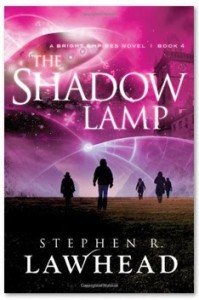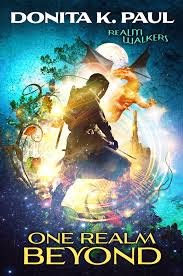
by Jason Joyner | Feb 19, 2014 | Blog, CSFF, Donita K. Paul, speculative fiction
Hey, is it time for the Christian Sci-fi and Fantasy tour again?
Yes, yes it is.
This month the feature is One Realm Beyond by Donita K. Paul. She is a steady and sure hand for speculative fiction. I’m too involved in other projects so I didn’t get to read this new book, but here’s a little magnification of the message.
See all the folks below? Check them out for the latest and greatest on this new series.
Here’s the Amazon blurb:
 Cantor D’Ahma waited his whole life for this day. Born with a gift to jump between worlds, the young realm walker is finally ready to leave his elderly mentor and accept his role as protector and defender of the realms. But mere hours after he steps through his first portal, Cantor discovers that his job will be more dangerous and difficult than he ever imagined. The realms are plagued with crime and cruelty, and even members of the once-noble Realm Walkers Guild can no longer be trusted. To make matters worse, his first assignment—finding a dragon to assist him on his quest—has led him to Bridger, who is clearly inept and won’t leave him alone. With the help of his new friends Bixby and Dukmee, Cantor must uncover the secrets of the corrupt guild before they become too powerful to be stopped. But his skills aren’t progressing as fast as he would like, and as he finds himself deeper and deeper in the guild’s layers of deceit, Cantor struggles to determine where his true allegiance lies.
Cantor D’Ahma waited his whole life for this day. Born with a gift to jump between worlds, the young realm walker is finally ready to leave his elderly mentor and accept his role as protector and defender of the realms. But mere hours after he steps through his first portal, Cantor discovers that his job will be more dangerous and difficult than he ever imagined. The realms are plagued with crime and cruelty, and even members of the once-noble Realm Walkers Guild can no longer be trusted. To make matters worse, his first assignment—finding a dragon to assist him on his quest—has led him to Bridger, who is clearly inept and won’t leave him alone. With the help of his new friends Bixby and Dukmee, Cantor must uncover the secrets of the corrupt guild before they become too powerful to be stopped. But his skills aren’t progressing as fast as he would like, and as he finds himself deeper and deeper in the guild’s layers of deceit, Cantor struggles to determine where his true allegiance lies.
Julie Bihn Keanan Brand Beckie Burnham Mike Coville Pauline Creeden Vicky DealSharingAunt Carol Gehringer Rebekah Gyger Janeen Ippolito Carol Keen Krystine Kercher Emileigh Latham Jennette Mbewe Shannon McDermott Meagan @ Blooming with Books Melanie @ Christian Bookshelf Reviews Rebecca LuElla Miller Joan Nienhuis Nissa Donita K. Paul Audrey Sauble Chawna Schroeder James Somers Jojo Sutis Jessica Thomas Steve Trower Shane Werlinger Jill Williamson Deborah Wilson

by Jason Joyner | Jan 22, 2014 | Blog, CSFF, dystopian, Jill Williamson, Outcasts, speculative fiction, writing craft, young adult
Hey-o boys and femmes.
I’ve talked about Jill Williamson and her cool series The Safe Lands, and our feature book Outcasts, book 2 in the series. My recap of the first book Captives is here, and my review of Outcasts is here.
The series is geared for Young Adult audiences. It also falls under the category of dystopian fiction, which is all the rage right now. Think The Hunger Games, Divergent, and Steelheart as recent stories that fit the genre.
So what is dystopian fiction?
If utopia is the term for a perfect place, then dystopia is the opposite. Dystopian stories take place in a setting where something has gone wrong. Either society has broken down and there is chaos, or there is a controlling factor which rules society in a dysfunctional way.
Even though it has become popular lately, it has been around for a while. Classic books like 1984 or Brave New World are dystopian. It’s the opposite of the idea behind Star Trek, where humanity progresses to higher standards and behavior. Instead, things get worse. It relates to fears that humanity is going to mess things up. Maybe we ruin the planet, or a yet undiscovered virus will wipe out a majority of the population, or we turn to dictatorships for control. Somehow, things are going to go bad.
Some may ask, “Why is this a genre for Christians to write about? Don’t we have a future hope? Aren’t things going to get better?”
Valid questions, but I would argue that it is precisely the Christian who needs to be speaking into this genre. A lot of writers in this have a pessimistic view of the future. Christians can provide the hope and light needed to balance things out. With the caveat that it can’t be preachy.
Consider the Garden of Eden. This could be considered the first dystopian story. Adam and Eve lose fellowship with their Creator over their sin, and now they live in a harsh world. Noah is very much in this vein as well.
How about some of the stories in Judges?
Would the Israelites raised on stories of King David think that exile and being ruled by Persia, Greece, and Rome would qualify as dystopian?
Christians have survived the fall of the Roman Empire. Our faith has survived centuries of conflict in Europe and around the world.
Finally, what about the Apocalypse? No matter your interpretation of the Book of Revelation, it is clear that the story reflects a dystopian time that is overcome by the Prince of Peace at the last.
Christians can truthfully write about a future where things have broken down in some way because we recognize that we live in that now. The world is not as it should be, and a ragamuffin group of rebels against the status quo is running around claiming a man rose from the dead and can bring living water.
A series like the Safe Lands just amplifies it for dramatic effect. The cool thing is that Jill does it without the preachy aspect. It will make teens think, seeing examples of good and bad, without pointing to a character and saying, “See that? That is what is bad for you. So stay away from the bad.”
It’s what I love about speculative fiction. The “what if” questions that you can ask when you suspend reality, whether through fantasy, science fiction, steampunk, cyberpunk, time travel, or plain old dystopian. So for Jill and other writers venturing into such places, go for it. It’s awesome.
If you want to see some more feedback about Outcasts, then Becky Miller has a list of all of the participants and their posts.
What do you think? Is there something about the dystopian genre that we should be wary of as Christians, or are there ways to work redemptively through it? Share below.
—

by Jason Joyner | Jan 22, 2014 | Blog, dystopian, Jill Williamson, Outcasts, reviews, speculative fiction, young adult
 Hey-o boys and femmes!
Hey-o boys and femmes!
It’s day 2 of our featured book, Outcasts by Jill Williamson, the second in the Safe Lands series. Yesterday I recapped book 1, Captives.
What about Outcasts? Does it avoid the sophomore slump? Is it another Empire Strikes Back?
The story follows the remnant of Glenrock, a village that survived the thin plague but stayed out of the walled, totalitarian Safe Lands nearby. In Captives, they were forcibly taken into the Safe Lands.
Levi, the oldest brother who had to take over eldership of the Glenrock remnant, is hiding out in the underground with his group. He’s working with Rebel leaders, but he doesn’t know if he can trust them with his people. They have their own agendas, and it may not be what Levi thinks.
Mason, the middle brother, continues to work and act as an undercover spy for his people. He’s trying to get information out of Ciddah, the head medic he works for. His heart is betraying him, but what if she betrays him first.
Omar is the youngest brother who opened the door for the Safe Lands enforcers to come to Glenrock. He regrets his actions and tries in his own way to atone for them, but his addictions developed from the Safe Lands hinder his progress.
Together they need to free the Glenrock children from the boarding house before they can find a way out of the Safe Lands. But with powerful enemies and questionable allies, will they survive or will they be caught and prematurely liberated from this life?
Jill Williamson is a dynamo of a woman. She is full of energy and imagination in real life, and it shows in Outcasts. There are tons of fun touches in the futuristic world that make the Safe Lands come alive. There are many futuristic novels out there to compete, but Jill puts a unique spin on many things. The reader will enjoy making connections with some of our real life items and how they develop in the future.
As Becky Miller pointed out in her first post, Outcasts deals with real life issues head on, from drug addiction to sexual desires, but it is all handled in a realistic and honest fashion without glamorizing any of it. The negative consequences of vices are clear, but not in a preachy manner. This book has ideas that give it a heft that some other books miss in dealing with teens and twenty-somethings. The characters anchor these ideas, as they wrestle in different ways with the issues. Omar gave himself over to pleasures that he realizes is damaging, but he has a hard time getting past them. Some of the consequences come out at very inconvenient times, which keeps the plot twisting. Meanwhile Mason, the reasonable brother, still deals with some real temptation.
Overall the book is a very enjoyable read. There are a few sequences where a lot of characters are doing things and it gets confusing for a little while. The book is the second in a series, so there are things that a person would be confused about if they started with Outcasts. The solution is simple – get Captives and read it first!
Becky Miller has all of the posts from the tour updated on her blog. Be sure to check them out, and I’ll be talking a little deeper about the book tomorrow.
—
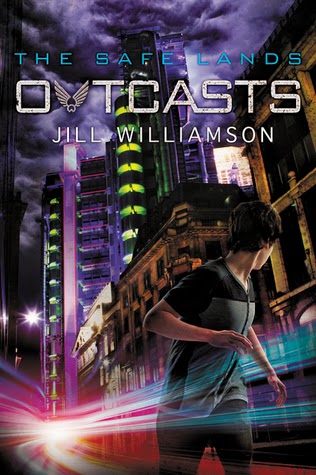
by Jason Joyner | Jan 20, 2014 | Blog, CSFF, dystopian, Jill Williamson, speculative fiction, writing craft, young adult
Hey-o boys and femmes. Welcome back to the Christian Sci-fi and Fantasy blog tour, where the best in Christian speculative fiction is highlighted.
 This month we’re featuring the book Outcasts by Jill Williamson. It is the second book in the Safe Lands series.
This month we’re featuring the book Outcasts by Jill Williamson. It is the second book in the Safe Lands series.
In the first book, Captives, we learn about a post-pandemic America. The Safe Lands is a walled city that has survived and has developed its own culture and lives by the philosophy of “find pleasure in life.” The problem is that they can only control the thin plague – they can’t cure it. And it is making their women sterile.
Glenrock is a village that exists outside the Safe Lands and lives in a much more rural existence. The villagers have a patriarchal society, continue to fellowship with God, and do things on a natural level.
When leaders from the Safe Lands decide to ask Glenrock to join them to help with their fertility issue, they assumed the villagers would want to join for the benefits of technology. But the plan goes awry and many villagers are killed.
Three brothers, sons of Papa Eli, must make their way in the Safe Lands. Eldest Levi has the mantle of village elder and wants to rescue his people from their clutches.
Mason was trained as a healer in the village, and now is placed in the medical system of the Safe Lands and looks for a way to not only save his people, but stop the thin plague as well.
Omar, the youngest, delivered his people to the Safe Lands in exchange for power and prestige, things he couldn’t accomplish on his own in the village. However, his acceptance of Safe Land life will come with a cost.
Captives starts an intriguing young adult trilogy with adventure and thought-provoking commentary on our modern life. I’ll talk about Outcasts in a later post.
For more information, you can check out my prior posts on Captives. The folks below will be discussing Outcasts during the tour as well, and Becky Miller is our tour master and will update with all the latest.
Red Bissell
Thomas Fletcher Booher
Beckie Burnham
Pauline Creeden
April Erwin
Victor Gentile
Ryan Heart
Timothy Hicks
Julie Bihn
Carol Keen
Shannon McDermott
Meagan @ Blooming with Books
Melanie @ Christian Bookshelf Reviews
Rebecca LuElla Miller
Joan Nienhuis
Nissa
Jalynn Patterson
Writer Rani
Chawna Schroeder
Jacque Stengl
Jojo Sutis
Steve Trower
Phyllis Wheeler
Deborah Wilson
—
Legal mumbo-jumbo: In conjunction with the CSFF Blog Tour, I received a free copy of this book from the publisher.
—-
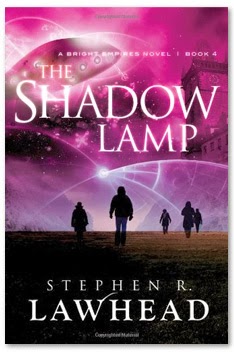
by Jason Joyner | Nov 14, 2013 | Blog, Bright Empires, CSFF, reviews, speculative fiction, Stephen Lawhead
In Which The Butter Is Stretched Too Thin Over The Toast
Hello again CSFF Tour fans. The monthly focus on Christian speculative fiction is wrapping up on the fourth book of the Bright Empires series,
The Shadow Lamp by
Stephen Lawhead. Yesterday I did
a brief recap of the other three books so far.
This link will take you to all of my prior posts on the Bright Empires series.
Lawhead said this was an ambitious series for him and that he didn’t think he could write something like it earlier in his career. Now he was at a point that he could wrestle it.
Out of four rounds so far, the score card for this fight would be Lawhead 3 to 1. Unfortunately, The Shadow Lamp misses the mark in comparison to the other books.
It is a major challenge to find a story that can stretch for a trilogy, much less five books. There has to be enough conflict and high enough stakes to carry a reader through to the end.
The Bright Empires series has a significant crisis to solve by the end of book five – the potential destruction of the universe. So that’s something.
The problem with book four is that it became too much of a set up story. There is a lot of shuffling the pieces to get them into the proper position. However, the stakes do not often grab the reader and make them care enough about what happens.
For instance, Lady Fayth and her loyal manservant Giles separate from the main group of heroes and get lost in an unknown dimension. There are harrowing circumstances, but the reason for their departure and the subsequent trial is nebulous. I shrugged my shoulders. Okay, why did that happen?
There are numerous plot points swirling around from the various players trying to figure out ley travel through dimensions for their own purposes. Some of them explain some background or seem to be moving somewhere, only to fizzle out. Maybe there is more to the story of Douglas, or the pirate attack suffered by the Burleigh men, but the significance was lost to me.
There were also two gatherings where educated people talked. A lot. They set up the huge consequences that happened in the prior book and pointed to the final act, but there wasn’t much action or development within The Shadow Lamp itself.
The writing quality was still well done. Lawhead is so good at description and setting from his research and experience. I’m invested enough in the story that I will see it through to the end. I have faith that the last installment will be worth following this series for five years from when it released to its conclusion next year. But The Shadow Lamp will be the filler episode that is quickly forgotten in the midst of the other books.
One other factor has been discussed elsewhere in the tour, but Lawhead has discussed a little more theology in books 3 and 4 over the first two books.
I could see the seeds he planted and was excited about the firstfruits revealed in The Spirit Well. But in The Shadow Lamp, he takes the mythology he’s created for the story regarding time and the idea of the multiverse and places it against the nature of God, in my opinion. Basically, if the heroes don’t fix things, the timestream will collapse on itself and destroy everything.
I don’t have a problem with a big cataclysm in a book – the bigger the stakes the better, usually. Like bacon. You can’t have too much bacon. But I digress.
The issue is when this can happen despite God. That’s what it sounds like could happen. Maybe I’m wrong, or maybe he’ll clarify things in book five. Until then, my opinion was that this particular point is a detraction to the whole.
So, the take-home point? The Shadow Lamp is not a bad book. It’s just not very memorable. It is by no means a deal-breaker in reading the Bright Empires series. My experience with Lawhead is that he can be a streaky writer. Some of his books have been my favorites. And some…not so much. Unfortunately The Shadow Lamp will stay in the shadows of my memory when all is said and done.
—
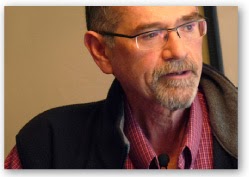
by Jason Joyner | Nov 12, 2013 | Blog, Bright Empires, CSFF, speculative fiction, Stephen Lawhead, The Shadow Lamp
In Which The Blogger Gets A Hand Cramp By Trying To Keep It All Straight
Hey, the CSFF Tour is continuing the focus on The Shadow Lamp, the fourth book in the five book Bright Empires series by Stephen Lawhead.
Lawhead is a prolific fantasy author with 24 books to his name. He’s written about the Crusades to Robin Hood, from Byzantium to a Celtic fantasy land, an Arthur series and kids books. Now he calls Bright Empires his most ambitious work yet.
It’s hard to bring together four different books into three short blog posts. But, that’s my task today.
Here’s a very quick run-down of the previous books.
The Skin Map – This kicks off the adventure by introducing us to Kit Livingstone, the main character who has inherited his family’s skill of ley travel, the journeying between dimensions of the multiverse. Except he’s not very skilled at it. He loses his girlfriend Mina in 16th century Prague, ends up betrayed and left to die in an Egyptian tomb, only to be rescued by said Mina, who is a quicker study than her boyfriend. It turns out a lot of people are looking for the Skin Map, a map made of the skin of Arthur Flinders-Petrie, a man skilled at ley travel who tattooed directions on his own skin using strange symbols as code. Guess he won’t lose that map…
The Bone House – Now there are more stories bouncing back and forth in time. We learn the origin of the villainous Lord Burleigh, who was the bad guy in the previous book. Arthur is looking for a way to save his wife. Kit and Mina try to dodge Burleigh, and Kit being Kit gets stranded in the Stone Age and ends up in a Bone House. Funny how that worked out…
The Spirit Well – Now Kit stumbles on a way out of the Stone Age and is reunited once again with Mina. A new traveler, Cassandra Clarke, an American paleontologist, has fallen through time and has been found by the Zetetic Society, a group dedicated to ley travel and watching out for good. If everyone could just find the blasted Skin Map, everything would be alright. Of course, there are different folks with their own agendas weaving through time. And one traveler might just have broken the universe…
Whew. There’s a lot to chew on there. Lawhead is a skilled writer and researcher. He travels widely and is very good with the historical detail, so the various locales are very intriguing. He writes in a slightly detached style giving the book a subtle whimsy and British feel. So far, very good. Like he says, the books are unique in the speculative fiction field.
If you want to see all of my posts on the Bright Empires series, here’s the link to all the tags. Fittingly, like the narration in the series the posts don’t necessarily come in order. You can also go to Stephen Lawhead’s Facebook page or author page. Finally, Becky Miller is our tour guide, and she gathers all the posts together here from all of the participants. I’ll have my review of The Shadow Lamp tomorrow.
Of course, if you can figure out time travel, you can read it right now.
—

 Cantor D’Ahma waited his whole life for this day. Born with a gift to jump between worlds, the young realm walker is finally ready to leave his elderly mentor and accept his role as protector and defender of the realms. But mere hours after he steps through his first portal, Cantor discovers that his job will be more dangerous and difficult than he ever imagined. The realms are plagued with crime and cruelty, and even members of the once-noble Realm Walkers Guild can no longer be trusted. To make matters worse, his first assignment—finding a dragon to assist him on his quest—has led him to Bridger, who is clearly inept and won’t leave him alone. With the help of his new friends Bixby and Dukmee, Cantor must uncover the secrets of the corrupt guild before they become too powerful to be stopped. But his skills aren’t progressing as fast as he would like, and as he finds himself deeper and deeper in the guild’s layers of deceit, Cantor struggles to determine where his true allegiance lies.
Cantor D’Ahma waited his whole life for this day. Born with a gift to jump between worlds, the young realm walker is finally ready to leave his elderly mentor and accept his role as protector and defender of the realms. But mere hours after he steps through his first portal, Cantor discovers that his job will be more dangerous and difficult than he ever imagined. The realms are plagued with crime and cruelty, and even members of the once-noble Realm Walkers Guild can no longer be trusted. To make matters worse, his first assignment—finding a dragon to assist him on his quest—has led him to Bridger, who is clearly inept and won’t leave him alone. With the help of his new friends Bixby and Dukmee, Cantor must uncover the secrets of the corrupt guild before they become too powerful to be stopped. But his skills aren’t progressing as fast as he would like, and as he finds himself deeper and deeper in the guild’s layers of deceit, Cantor struggles to determine where his true allegiance lies.



